Israel Reportedly Concerned Over US Intention For A 'Partial' Deal With Iran
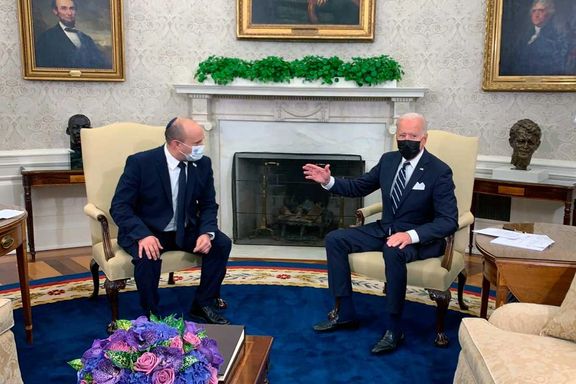
Israel is increasingly concerned that the US is aiming for a partial nuclear deal with Iran only to stop its uranium enrichment, Israel Hayom reported Sunday.

Israel is increasingly concerned that the US is aiming for a partial nuclear deal with Iran only to stop its uranium enrichment, Israel Hayom reported Sunday.
The publication also said that Prime Minister Naftali Bennett will not meet with US Special Envoy Robert Malley who is visiting Israel to show his displeasure. The American envoy is seen as spearheading ‘a deal at any cost’ approach in the Biden Administration.
According to briefings received by Israeli officials the United States is willing to lift the most important sanctions in exchange for a simple cessation of uranium enrichment by Iran.
That would leave a considerable quantity of 20-percent and 60-percent enriched uranium in Tehran’s possession and all the enrichment equipment it has assembled recently.
The US had pledged to aim for a stronger agreement with Iran after it launched indirect talks in April but is now reportedly focused on stopping further enrichment.
This would be even more than Iran has been demanding during the past months, which is a return to the status quo of May 2018 when former president Donald Trump withdrew form the Joint Comprehensive Plan of Action or JCPOA.
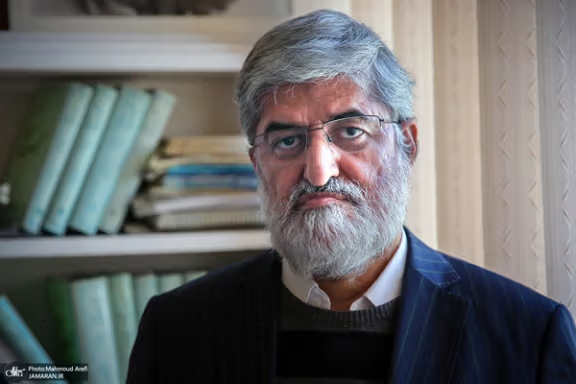
A former parliamentary leader in Iran says that refusing to directly negotiate with the United States is an “obvious mistake” and against national interests.
The outspoken politician Ali Motahari, who was deputy-speaker in the previous parliament, said refusal to directly engage with the United States is simply a “revolutionary gesture and against the national interest.”
Supreme Leader Ali Khamenei has banned direct talks with the United States and the current key foreign policy players appointed by President Ebrahim Raisi who took office in August are known as hardliners close to Khamenei’s office. In recent weeks, Iranian diplomats have been demanding the US free Iran’s frozen funds as a “goodwill gesture” before Iran shows flexibility.
Motahari in his tweet went on to say that “In these past few years it became clear that Russia, China and Europe” are not the critical actors. Addressing the hardliners, he wrote that if Qasem Soleimani’s assassination is the reason for refusing to directly negotiate with the US, the decision to punish the perpetrators remains in place.
Soleimani, who was Iran’s top military and intelligence operator in the Middle East was killed in a US drone strike ordered by former president Donald Trump on January 3, 2019.
As Iran has delayed rejoining the Vienna talks for five months its economic crisis has deepened with the national currency rial falling 20 percent since Raisi took office.
Economists and financial experts in Tehran say that uncertainty about the nuclear talks is the main reason why the rial is losing value against major currencies. On Friday, two economists told the Fararu website that for the stability of rial all major sanctions should be lifted, but in the meantime negative and ambiguous statements by Iranian officials dissipates confidence and leads to rial’s fall.
Reports say that demand for US dollars has increased in recent days as people take advantage of their annual prerogative to buy up to $2,000 from legal currency dealers.
There is also the issue of approving financial reform bills that have languished for more than three years. The international Financial Action Task Force (FATF) has blacklisted Iran demanding legislation against money laundering and financing of terrorism. The designation by itself is enough to keep Iran’s banking relations with other countries restricted.
Iran has been spending from its currency reserves since US oil sanctions were imposed in 2018 and has resorted to printing money, which in turn has pushed inflation for essential goods to above 60 percent. Now, it planning to stop subsidizing food and medicine, which will push prices even higher, with all its political risk.
More and more public figures, including high-ranking clerics and politicians, such as Motahari, have been appealing to decision makers to speed up nuclear talks. Hardliners in charge of the government, on the other hand, are posturing to get more concessions from the United States.
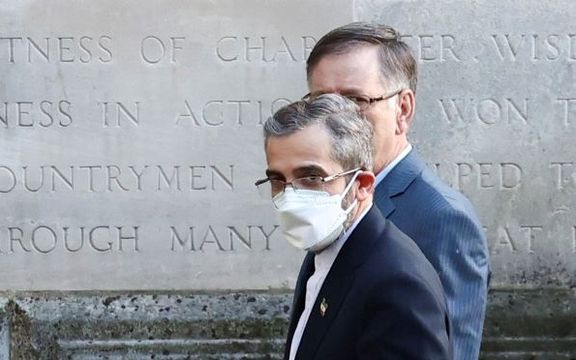
Ahead of new talks with world powers in Vienna, Iran’s top nuclear negotiator has reiterated that lifting of US sanctions will be the focus of the negotiations.
“Iran has stayed in the 2015 nuclear agreement, Joint Comprehensive Plan of Action (JCPOA), and complied with its commitments under the deal," Ali Bagheri-Kani, who has been on a tour of European capitals this week, told the official news agency IRNA in London Thursday evening. "So, the first and foremost issue, which should be raised, is the removal of the US illegal sanctions on Iran."
In interviews with The Guardian and CNN's Christine Amanpour Thursday, Iran's top negotiator insisted that the US should lift its sanctions before Tehran returns to full compliance and offer guarantees that it would not leave a renewed JCPOA. Discussions on lifting US sanctions "should come to some sort of conclusion before" agreement is reached in Vienna, he told Amanpour.
The Vienna talks aim at reviving the 2015 JCPOA, which limited the Iranian nuclear program and was signed by Iran with the five permanent members of the United Nations Security Council (China, France, Russia, the United Kingdom and the United States) plus Germany.
“We need verification, and this remains unresolved. It is one of the issues that remains not finalized. It is not enough for the ink to be put on the agreement,” Iran's top negotiator told the Guardian, while emphasizing that Tehran would not negotiate on its "defense capabilities" or security.
Hardliners in Iran argue that surviving US sanctions has strengthened Tehran’s position. Javan newspaper, which is affiliated with the Revolutionary Guards, recently said Iran would be returning to talks with a “full briefcase,” as it had accumulated 210kg of uranium enriched to 20 percent and 25kg enriched to 60 percent. Under the JCPOA Iran was allowed to enrich only to 3.67 percent.
Although the hardliners argue Iran has survived US sanctions, some observers in Iran and abroad say the Islamic Republic faces unsurmountable economic challenges if the restrictions are not lifted.
Iran insists that its higher enrichment does not violate the JCPOA as its steps were taken in response to the re-imposition of US sanctions. Such steps were "within the framework of the JCPOA," Bagheri-Kani told the state-run English channel Press TV Friday.
Iran has also trimmed back monitoring by the International Atomic Energy Agency (IAEA) to that required under the Nuclear Non-Proliferation Treaty. Russian Deputy Foreign Minister Sergei Ryabkov said on Thursday that Washington should effectively demonstrate its intention to revise its sanctions policy against Tehran in order to revive the JCPOA but also emphasized that the Iranian side should carry out a series of measures to make it clear to all the other parties and to the IAEA that there would be no "deviations from the parameters of the JCPOA in the nuclear field."
According to The Guardian, Bagheri-Kani said guarantees were also required from the European parties to the JCPOA that they would trade with Iran, regardless of the US position, possibly by using a blocking statute nullifying the effect of US sanctions on European firms trading with Iran. Bagheri-Kani denied that Iran had stalled the resumption of the Vienna talks to further develop its own nuclear program.
When former US president Donald Trump imposed sanction in 2018, European signatories of the JCPOA tried to keep trade alive with Iran, but fear of the sanctions dissuaded private companies from doing business with Tehran.
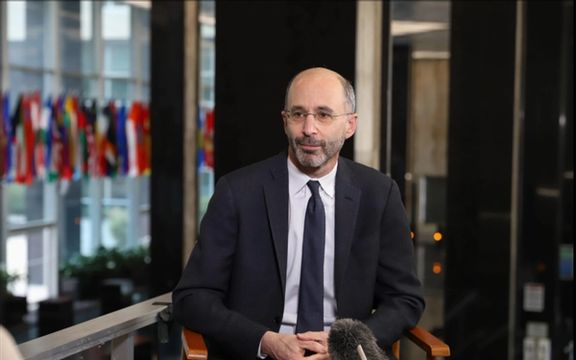
The US State Department announced on Thursday that Special Envoy for Iran Robert Malley is on his way to the Middle East to hold consultations with US allies.
Nuclear negotiations with Iran are set to resume at the end of this month after a five-month suspension by Tehran.
The statement said Malley “will coordinate our approaches on a broad range of concerns with Iran, including its destabilizing activities in the region and the upcoming seventh round of talks on a mutual return to full compliance with the JCPOA.”
Iran has hardened its posture prior to the talks, insisting that its nuclear issue was resolved in 2015 and negotiations should be about lifting US sanctions imposed by former president Donald Trump in 2018.
In addition to Iran’s expanding uranium enrichment activities, regional countries have long been concerned about its interventions in countries such as Syria, Iraq, Yemen, Lebanon and elsewhere. One of the demands by the Trump administration was that Tehran should stop its “malign behavior”.
The Biden Administration has put the priority in restoring the nuclear deal (JCPOA), saying that once Iran’s atomic program is restricted, other issues can be addressed.

Iran will adopt an uncompromising stance when it resumes nuclear talks betting it has the leverage to win wide sanctions relief, Reuters reports in an analysis.
The stakes are high, since failure in the negotiations resuming in Vienna on November 29 to revive a 2015 nuclear deal would carry the risk of a fresh regional war.
Iran's arch foe Israel has pushed for a tough policy if diplomacy fails to rein in Iran's nuclear work, long seen by the West as a cover for developing atomic bombs.
Tehran denies it has ever sought to develop nuclear weapons and says it is prepared for war in defense of its atomic program.
Iranian hardliners believe that a tough approach, spearheaded by their strongly anti-Western Supreme Leader Ayatollah Ali Khamenei, can force Washington to accept Tehran's "maximalist demands", the officials and analysts said.
"Our nuclear facilities are up and running ... We can live with or without the deal... The ball is in their court," said a hardline Iranian official who asked not to be named.
"Progress means lifting all those cruel sanctions ... Iran has never abandoned the deal. America did."
Iran began breaching nuclear restrictions under the pact in response to a decision in 2018 by then US President Donald Trump to withdraw from the agreement and reimpose harsh sanctions that have devastated Iran's economy.
In an apparent bid to pressure Trump's successor Joe Biden to lift sanctions, Iran accelerated those breaches by rebuilding enriched uranium stocks, refining it to a higher fissile purity and installing advanced centrifuges to speed up production.
Dramatically upping the ante, Iran has also limited access given to UN nuclear watchdog inspectors under the nuclear deal, restricting their visits to declared nuclear sites only.
Foreign Minister Hossein Amir-Abdollahian tweeted that Tehran was ready "to deliver a good agreement", but some Western diplomats said a deal hinged on Tehran's readiness to show flexibility when the talks resume.
Failure to agree by early 2022, they said, would make the pact's revival less likely due to a key technicality - the longer Iran remains outside the deal, they said, the more nuclear expertise it will gain, shortening the time it might need to race to build a bomb if it chose to.
Kasra Aarabi, senior Iran analyst at the Tony Blair Institute for Global Change, said by using delays in the talks, advancing its atomic expertise and continuing to support paramilitary allies in the region, Khamenei and his hardline allies were "genuinely convinced they can intimidate the U.S. into granting more concessions without facing any consequences".
FAILURE OR SUCCESS
The fact that indirect talks between Tehran and Washington paused after the June election of hardline President Ebrahim Raisi signaled that the likelihood of failure was greater than chances of success of the negotiations, two Iranian sources close to the country's power center told Reuters.
Ali Vaez, senior Iran analyst at the International Crisis Group, said the negotiations were bound to fail "if Iran's opening salvo is indeed its bottom line".
"By insisting on its maximalist demands, Iran is likely to get neither sanctions relief nor the guarantees it is seeking."
With differences between Tehran and Washington still vast after six rounds of indirect talks on some key issues - such as the speed and scope of lifting sanctions and how and when Iran will reverse its nuclear steps - chances of a deal seem remote.
Iran insists on immediate removal of all Trump-era sanctions in a verifiable process. Washington has said it would remove curbs "inconsistent with the 2015 nuclear pact" if Iran resumed compliance with the deal, implying it would leave in place others such as those imposed under terrorism or human rights measures.
Tehran also seeks guarantees that "no US administration" will renege on the pact again. But Biden cannot promise this because the nuclear deal is a non-binding political understanding, not a legally binding treaty.
The pact, negotiated under former US President Barrack Obama, was not a treaty because there was no way the Democratic president could have secured the approval of the U.S. Senate.
'NOT WORTH PURSUING'
Things are not much better for Biden.
Under the US Constitution, treaties require the consent of two-thirds of the 100-member Senate. Given that it is now split between 50 of Biden's fellow Democrats and 50 Republicans, there is no plausible way for Biden to meet that threshold.
Many Republican senators detest the nuclear agreement and even some Democrats oppose it. However, Rob Malley, the US special envoy for Iran, said last month :"Our intent is to be faithful to the deal if we could get back in."
Eurasia Group analyst Henry Rome said many hardliners in Iran were convinced that, since the deal has failed once, "it's not worth pursuing unless it's fundamentally altered".
Despite US sanctions, China has provided a financial lifeline to Iran by importing supplies of Iranian oil that have held above half a million barrels per day on average for the last three months.
Text from Reuters
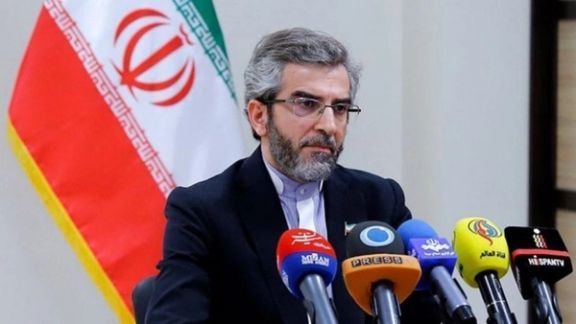
With Iran’s nuclear issue “resolved by the 2015 agreement” only lifting US sanctions needs to be agreed when talks resume in Vienna, Iran’s top negotiator says.
“We do not have nuclear talks, because the nuclear issue was resolved in 2015 in the form of an agreement reached between Iran and the P5+1,” Ali Bagheri-Kani, negotiator and a deputy foreign minister, told Iranian state television in an interview from Paris.
The statement is another sign of Iran’s hardening posture. On Monday Iran’s foreign ministry insisted that the US must meet three conditions for the talks to proceed and success. Spokesman Saeed Khatibzadeh told reporters that the US should lift the sanctions “at once”, admit culpability and provide guarantees that it will not withdraw from the agreement again. If these are real negotiating demands and not public posturing, the future of the talk look bleak, commentators in Iranand abroad said.
The Vienna talks aim at reviving the 2015 JCPOA (Joint Comprehensive Plan of Action), which limited the Iranian nuclear program and was signed by Iran with the five permanent members of the United Nations Security Council (China, France, Russia, the United Kingdom and the United States).
The Iranian lead negotiator's reaction was made one day after French Foreign Minister Jean-Yves Le Drian said the talks with Iran must resume where they left off on 20 June by Iran after six rounds of talks with the administration of former President Hassan Rouhani.
Problems had risen, Bagheri-Kani explained, when the US left the JCPOA in 2018 and imposed ‘maximum pressure’ sanctions, which sent the Iranian economy into recession.
"The main issue we are facing now is the consequences of the US withdrawal from the JCPOA, which are limited to the illegal sanctions imposed against the Islamic Republic of Iran,” Bagheri-Kani said.
Bagheri-Kani spoke Tuesday evening after a meeting with Philippe Errera, the French foreign ministry political director and lead negotiator. Bagheri-Kani is on a tour of European capitals, which began in Moscow. His remarks came a day after French Foreign Minister Jean-Yves Le Drian said the Vienna talks, in which Washington participates indirectly, should resume where they left off on June 20.
Bagheri-Kani described his talk with Errera as “detailed, frank, serious, constructive and forward-looking,” and noted there was a "very good opportunity” to improve relations with France as it prepares for a six-month stint as president of the European Union's Council beginning in January.
In a tweet Tuesday, Mikhail Ulyanov, Russia's envoy to the International Atomic Energy Agency (IAEA), said the upcoming Vienna talks would be "a remarkable event after a long (almost 5,5 months) break." Ulyanov said the talks "must be a successful exercise” as there was “no acceptable alternative” to the JCPOA.
China said Monday that the US should rectify its actions in unliterally leaving the JCPOA and so lay the basis for Iran to again accept the JCPOA limits in its nuclear program, which it began exceeding in 2019 in response to US sanction. The official Xinhua news agency cited a Saturday phone call between Foreign Minister Wang Yi and his Iranian counterpart Hossein Amir-Abdollahian.
In Iran, officials have been playing down the importance of restoring the JCPOA. "The JCPOA isn't a priority for our country, and we will not waste all our capacities waiting for the outcome of the [Vienna] talks," said Fada-Hossein Maleki, a member of the parliamentary National Security and Foreign Policy Committee, Wednesday.
Maleki said that Iran needed guarantees that all parties would abide by the agreement in future: "The talks must bear practical and tangible results for us. The Islamic Republic will no longer put all its eggs in the JCPOA basket as it was done during the Rouhani administration [which left office in August]…We will not allow the talks to become attritional.”